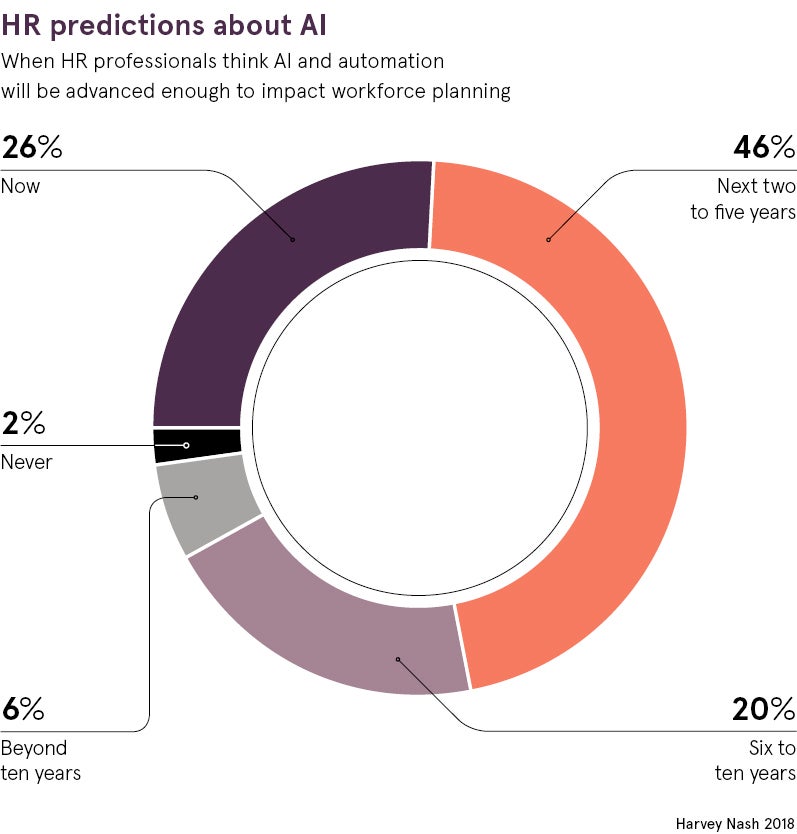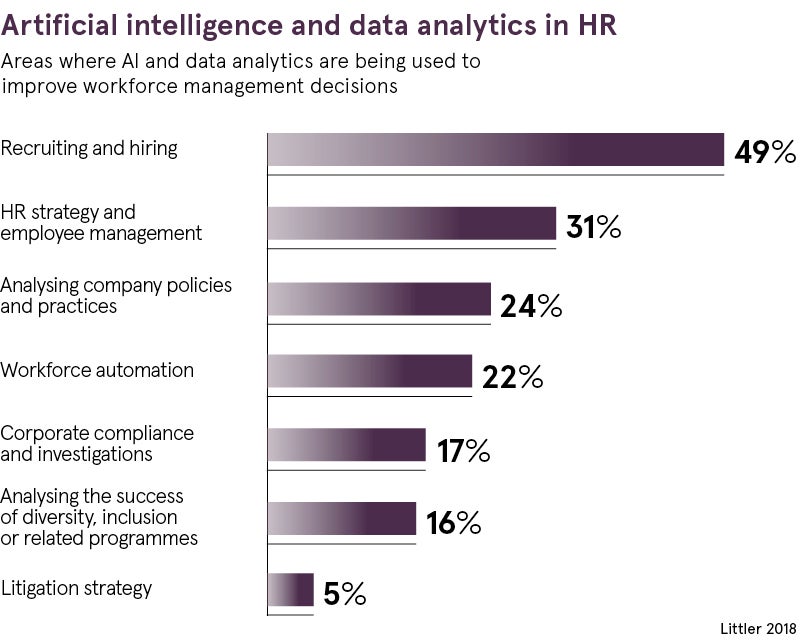That artificial intelligence (AI) is dramatically transforming the human resources industry is somewhat ironic, given the growing global clamour for robots, usurping millions of jobs. HR, though, is not traditionally associated with pioneering nascent technology, and failure to deploy and develop AI could prove a fatal mistake.
“When so much time is spent debating how AI and automation might replace roles, it’s easy to forget that these very same technologies have a huge role to play in finding, securing and retaining employees,” Andrew Lawson, executive vice president and general manager of Salesforce in the UK, points out.
“In this era of constant change and digital skills shortages, finding the right talent is more challenging than ever. By using AI and automation, businesses can identify a diverse range of top candidates quickly and easily, and at a pace that keeps stride with the frenzied speed of modern business.”
How AI can help with recruiting
Picking up this thread, Jeffery Ng, chief scientist at startup incubator Founders Factory, says: “For HR departments, finding the right candidate for a job is like locating a needle in a haystack. Research tells us that 79 per cent of recruiters’ time is spent sifting through a dense ecosystem of possibilities.
“Advances in AI have helped with recruitment’s inefficiencies. Until recently it used to take weeks and months to build a long list of prospective employees; now it takes minutes, if not seconds.
“AI is capable of much more than delivering efficiency. Developments in natural-language analysis and semantic understanding can be applied to the recruitment process. Machines can go beyond assessing just the candidate’s résumé and take into consideration a person’s online presence, the company culture and overall fit more accurately.”
As these technologies continue to disrupt the workplace, it is vital for HR departments to embrace both AI and the human element of HR to attract and retain employees
Deloitte’s leader of HR transformation Richard Coombes says: “AI offers a host of new capabilities for HR departments, such as decoding video interviews to determine cognitive ability, identifying workers’ career options and training managers to improve their leadership skills. It also gives HR teams the opportunity to offer an always-on, personalised, concierge-type service to their organisations, which would not otherwise be viable.”
HR departments currently lack technical skills
However, there is one sizeable, inherent problem, argues Liz Sebag-Montefiore, director and co-founder of 10Eighty, a London-headquartered career management and employee engagement organisation. “The trouble is many HR people aren’t very technically minded,” she says. “Their ability to make a case for HR having a share of the budget for AI and automation is a big issue.
“It is great if you can use data to help either identify potential problems and address them, or assist employees with managing their careers, so they are more engaged and productive. However, you have to be able to understand the data.
“HR departments tend to collect masses of data, but don’t seem able to do much with it. More technically-minded HR workers can apply technology to both the HR function and to learning and development applications.”
Clare Barclay, chief operating officer of Microsoft UK, agrees and warns that HR professionals who fail to improve their data literacy will indirectly damage the organisation by not recruiting and retaining talent. “Embracing AI is now an essential element of any successful business strategy and in HR it can deliver rapid value,” she says.
“Whether it’s harnessing machine-learning to screen new talent or using data analytics to offer more insightful workplace initiatives, AI is enabling HR professionals to move away from manual, repetitive tasks towards work that truly adds value.”
The key to success is AI and people working together
While AI enables people to be, well, more human, snubbing tech is as destructive as being overly reliant on it. Collaboration between human and machine is the winning formula. “Machine-learning, AI and automation can complement every HR worker’s day-to-day role to improve the employee support element of HR, the more human side of the job,” says Mr Lawson.
“As these technologies continue to disrupt the workplace, it is vital for HR departments to embrace both AI and the human element of HR to attract and retain employees.”
Latest Microsoft UK research, Maximising the AI Opportunity, shows “a staggering 68 per cent of HR professionals believe automating routine tasks will create time for meaningful work”, says Ms Barclay. “This indicates the crucial role AI can play in ensuring those in HR can focus on what truly matters: people.
“The blend of key soft skills, such as human empathy and judgement, together with the powerful analytical and predictive capabilities of AI, is a recipe for success in HR, driving more insightful, human-centric work now and in the future.”

HR’s unique role lies in preparing people to manage mixed workforce
Despite this, only 8 per cent of HR professionals in the UK believe their organisation has an AI strategy in place, according to the Microsoft study. Ms Barclay calls it “a worrying statistic” and says: “It underlines an apparent gap between those HR professionals aware of the AI benefits and those who are actively translating this insight into action.
“As the people responsible for hiring tomorrow’s workforce, retraining employees for the future and communicating the value of new initiatives, it’s critical HR leaders align with their organisation at every step of the AI journey to ensure success.”
Furthermore, Mr Coombes believes HR departments have an essential role to play in training humans to work alongside automatons. “Only 17 per cent of respondents to Deloitte’s Tech Trends 2018 survey said they are ready to manage a workforce in which people, robots and AI work side by side,” he says.
“This highlights the uniquely important role HR needs to play in helping organisations transform for the future world of work, including developing innovative ways of learning and providing training that can help workers contribute efficiently, creatively and consistently, no matter their roles. HR expertise will be crucial to ensure the technology is rolled out effectively.”
Ms Barclay stresses the need for speed. “In this era of unprecedented change, HR professionals cannot wait to see how AI plays out,” she concludes. “They, alongside other business leaders within their organisations, must actively create a roadmap for change that not only emphasises the ethical implication of merging human and machine capabilities, but crucially provides tools and training, so employees are best served. Success tomorrow requires action today.”
How AI can help with recruiting






